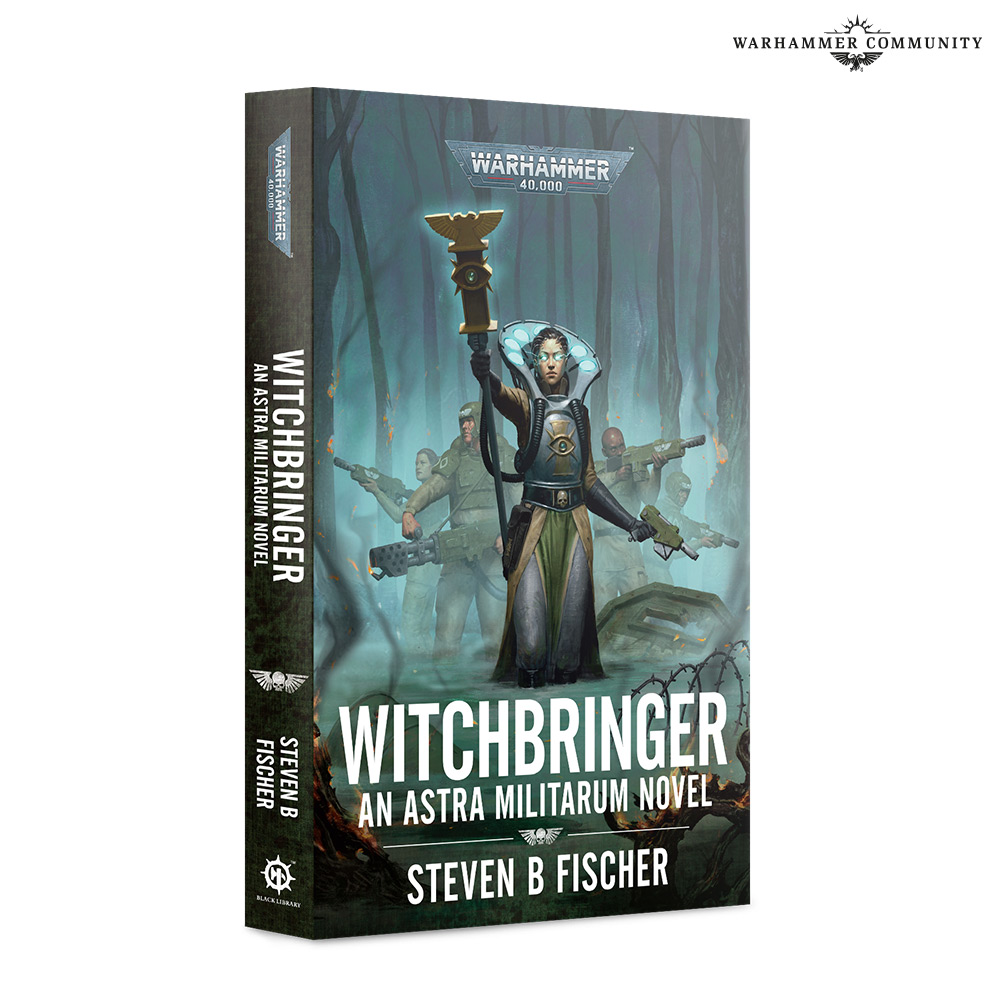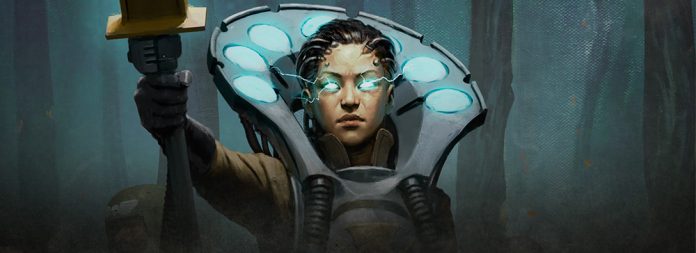The Astra Militarum novels are the Black Library’s proving ground, where writers new to the Black Library get their first shot at a full length novel. There’s been dozens of novels in the Astra Militarum series going all the way back to their days as the Imperial Guard, and as a crucible for Black Library histories they’ve launched Aaron Dembski-Bowden, Guy Haley, Rachel Harrison, and of course Dan Abnett started with the Imperial Guard too. Straight out of this career-launching series comes the latest Astra Militarum novel, Witchbringer by Steven B Fischer.
Once again, before we dive in it’s time to thank Games Workshop and the Harlequins of the Black Library for sending this out to review.

What’s a Witchbringer?
Glavia Aerand, once of the 900th Cadian Infantry, is a psyker. Feared and hated, yet dedicated to the service of the Emperor, she is sent back to her old regiment on the Chaos-tainted world of Visage, there to do or die against enemies both internal and external.
It’s a classic “You can never go Home” story, with Glavia starting off in the Schola Psykana before being posted back to the 900th to deal with prejudice, discrimination and – this being Warhammer 40k – a tide of heretics, witches and Chaos shenanigans. It’s a story steeped in suspicion, creeping dread and the threat of imminent, horrible death, but also one of Cadian heroism, comradeship and action. Pretty much as you’d expect for a Cadian novel given what Abaddon did, it’s also got a lot of Planet-broke-before-the-Guard did and is chock full of psykana weirdness.
Thematically I’d say Witchbringer is all about unease – the tension of returning home when the faces are the same but the people are different, the old adage of you can’t step in the same river twice because it’s not the same river and now you can freeze the water with your mind (which I believe is what Heraclitus meant when he said it). The world off kilter is a strong thread throughout, be that in the body horror of the Scholastica Psykana, the Corpsewood trees and endless mist of Visage or even just in the promotions and demotions that radically change the nature of the regiment Glavia returns to. A lot of that ability to get the characters unpleasantly and reader pleasantly off-balance is based on Fischer’s well realised setting. It’s a cliche to say “the planet/environment/whatever non-animate bit of the setting is a character”, but it’s a true cliche here. The sections on Visage in the mist and as the taint of chaos starts to take over are the best sections in the book, growing claustrophobic, cold and wet as the Guard are forced onto the back foot by the witches arrayed against them. There’s solid horror here as well, reminiscent of both the Steven King Mist, the schlock-horror Deathwatch as well as the crawling tree nastiness of Evil Dead, and this is a clever move. Sometimes Chaos is tentacles and angry screaming, or specific gods or whatever, but sometimes it’s dark wood, white mists and quietly lapping water, and this kind of slightly more banal – but still warp-infused craziness – is a welcome change from chaos being entirely about models coincidentally sold in your nearest GW.
The characters Fischer gives us are a mix of interesting spins on established concepts and slightly more boilerplate traditional action movie/GW tropes. A massive highlight of the early sections is the Schoolmaster of the Schola Psykana Glavia finds herself in, a nightmare-blanchitsu concept of arachnoform bionics, rotting flesh and a captive, gimp-like psyker who, despite the appalling horror of his body, mind, and approach, is a loyal servant of the God-Emperor. The Renegade Guardsman antagonist is a good spin on the concept, and has a good core of villany without being a Saturday-morning-cartoon level megalomaniac. Glavia herself is a little twist on the by now standard plucky, loyal, insubordinate Guard who speak their mind against authority. The psyker element gives her some additional interest and a different perspective though, something which unfortunately doesn’t always come across in the other characters. There’s a lot of fairly common soldier-story tropes here with unfortunately little exploring them beyond their generic forms. Colm Corbec, Private Vasquez and a fairly stock Sinister Priest all turn up in predictable order which is a bit of a shame. Massive props should be given though for the clear gender and racial parity Fischer establishes within the Cadians – recruits from a world’s worth of genetic diversity aren’t all white men anymore, and that’s a big plus for believable characters.
Unfortunately some of that stock work comes into the phrasing – particularly the dialogue – that perhaps reflects a new writer to the Black Library. While most of it is fine, there’s the occasional clunker line that tends to bring you out of the reading experience, particularly given that the homecoming theme needs to all be about feelings and the unspoken tension of returning to where you once were. There’s a lot of flatly stating motivation, and some bits where the characters spell out what would be better served with hints or tendencies, to the extent that in one or two places I really rolled my eyes at the characters. This is probably uncharitable of me – the dialogue is certainly better than in several other Black Library books that spring to mind – and I hope it’s something that Fischer gets a chance to develop in later works.
The End
For all that this isn’t the best Black Library book, I was pleased to have read it. The book ends on a solid, interesting cliffhanger and, despite the flaws in this one, I do want to see it resolved in a sequel. Overall, Glavia Aerand and her regiment are interesting, I liked further exploration of the ongoing GW metaplot after the fall of Cadia and the creepiness of Visage is well realised. This is a solid, if unremarkable, 40k novel, that hints at enough promise in the writer that I’ll look out with interest for his next works. What Fischer doesn’t nail this time, he’ll improve in the next – and what he does well here will be exciting stuff in the future.
You can find Witchbringer in the Black Library webstore.
Have any questions or feedback? Drop us a note in the comments below or email us at contact@goonhammer.com.


